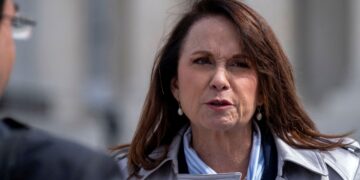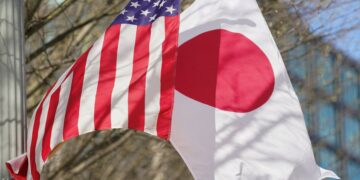WASHINGTON (Reuters) -Japan has canceled a regular high-level meeting with its key ally the United States after the Trump administration demanded it spend more on defense, the Financial Times reported on Friday.
U.S. Secretary of State Marco Rubio and Defense Secretary Pete Hegseth had been expected to meet their Japanese counterparts in Washington on July 1 for annual 2+2 security talks.
But Tokyo scrapped the meeting after the U.S. side asked Japan to boost defense spending to 3.5 per cent of GDP, higher than an earlier request of 3 per cent, the paper cited unnamed sources familiar with the matter, including two officials in Tokyo, as saying.
A U.S. official who did not want to be identified confirmed Japan had “postponed” the talks but said the decision was made several weeks ago. The source did not cite a reason. A non-government source familiar with the issue said he had also heard Japan had pulled out of the meeting, but not the reason for it doing so.
U.S. State Department spokesperson Tammy Bruce said she had no comment on the FT report when asked about it at regular briefing, and the Pentagon also had no immediate comment.
Japan’s embassy in Washington did not respond to a request for comment.
The Financial Times said the new higher spending demand was made in recent weeks by Elbridge Colby, the third-most senior Pentagon official, who has also recently upset another key U.S. ally in the Indo-Pacific by launching a review of a project to provide Australia with nuclear-powered submarines.
In March, Japanese Prime Minister Shigeru Ishiba said that other nations do not decide Japan’s defense budget after Colby called in his nomination hearing to be under secretary of defense for policy for Tokyo to spend more to counter China.
Japan and other U.S. allies have been engaged in difficult trade talks with the United States over U.S. President Donald Trump’s worldwide tariff offensive.
The FT said the decision to cancel the July 1 meeting was also related to Japan’s July 20 Upper House elections, at which the ruling Liberal Democratic Party is expected to suffer a loss of seats.
It comes ahead of a meeting of the U.S.-led NATO alliance in Europe next week, at which Trump is expected to press his demand that European allies boost their defense spending to 5 percent of GDP.
(Reporting by David Brunnstrom, Idrees Ali and Urvi Dugar; Editing by Don Durfee and Sandra Maler)















